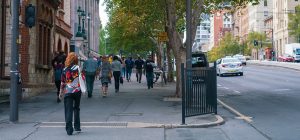How the new small bars in Adelaide’s West End influence people’s perceptions of safety and amenity is the focus of a study funded by the Foundation for Alcohol Research and Education (FARE).
The study, by Adelaide West End Association (AWEA) and Adelaide City Council (ACC), will look at people’s experience of the public realm near small bars holding up to 120 patrons in an area with an already high density of licensed premises.
Researchers will undertake observation surveys of sites in the West End at peak times, and analyse and compare patron behaviour and perceptions of safety near small bars with that of patrons near bigger licensed venues. They will also survey West End businesses and Adelaide West End Association members to gain further insight into the impact of small bars on the precinct.
Results will be compared with perceptions of safety audits in the West End undertaken over the last eight years by Adelaide City Council.
The study team includes AWEA President Andrew Wallace, a key advocate for liquor licensing reform, Jennifer West, the city council’s senior safety strategy consultant, and Richard Cooke, manager of the Population Health Monitoring Unit of South Australia’s Drug and Alcohol Services.
FARE Chief Executive Michael Thorn said that FARE was pleased to provide $19,756 for the Safer Places and Small Bars research project as one of 12 grants in its current research funding round.
“While research indicates that increasing the number of licensed venues can have a negative impact on safety, a view has emerged that small bars may have less of an impact because of the belief that they attract different patrons and patron behaviour,” Mr Thorn said.
“This study is of national significance, as it fills a research gap in the field of licensing reform around small bars and will help to inform future alcohol policy development.”
City of Adelaide Lord Mayor Stephen Yarwood believes this research will increase understanding of the effect small bars and their clientele have on the public realm. He notes that, “small bars add to the diversity of venues in the entertainment precinct, attracting a broader range people who want to socialise, catch a live band or watch a performance.
“This research will help us better understand what effect the increased venue and patron diversity has on safety in the precinct.”
FARE’s latest grants, to universities, hospitals and medical research institutes throughout Australia, include funding for evaluations, cross-sectoral research projects and pilot studies.
Since 2001 FARE has collaborated with a range of leading universities and institutes and invested more than $20 million in research that explores the extent and nature of alcohol harm in Australia.
FARE is also the principal supporting partner of the Centre for Alcohol Policy Research (CAPR), investing $4.5 million in the world-class alcohol policy research institute.
“Developing strong evidence-based policy is critical to reducing alcohol-related harms,” Mr Thorn said.
“FARE’s funding of new research will continue to help governments make informed policy decisions about a range of other alcohol-related harms.”






